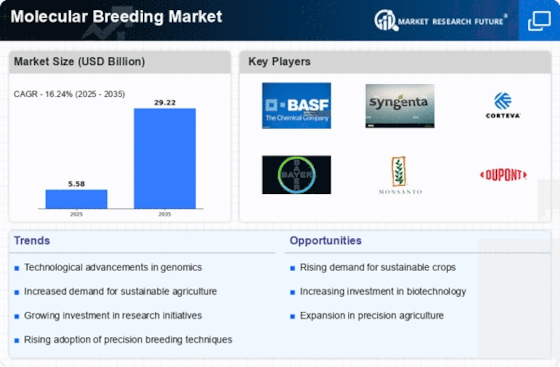Top Industry Leaders in the Molecular Breeding Market

Molecular Breeding Market Outlook
The Molecular Breeding Market is witnessing a dynamic and competitive landscape, driven by advancements in biotechnology, genomics, and the increasing demand for improved crop varieties. This market plays a pivotal role in revolutionizing traditional breeding methods by incorporating molecular techniques to enhance precision and efficiency. The competitive scenario is marked by a mix of established players, new entrants, and innovative startups, each vying for a significant share in this rapidly evolving sector.
Key Players and Market Share Analysis:
- Illumina
- LGC Limited
- Thermo Fisher Scientific
- SGS
- LemnaTec
- Charles River
- DanBred
- Intertek
Strategies Adopted by Market Leaders: Leading companies in the Molecular Breeding Market employ various strategies to maintain and expand their market presence. Strategic partnerships and collaborations with research institutions and agricultural organizations help these players stay at the forefront of technological advancements. Furthermore, investments in research and development enable them to introduce innovative solutions, thereby attracting a wider customer base. Continuous efforts to enhance product portfolios and expand their geographic reach are also prominent strategies adopted by market leaders.
Factors Influencing Market Share Analysis: The competition in the Molecular Breeding Market is influenced by several factors that impact the market share dynamics. Technological advancements, regulatory landscape, and intellectual property portfolios play a crucial role in shaping the competitive scenario. Companies with a robust intellectual property base may have a competitive advantage, as it can act as a barrier for new entrants. Additionally, the ability to offer cost-effective solutions without compromising quality is a key factor that contributes to market share growth.
New and Emerging Companies: The Molecular Breeding Market has witnessed the emergence of several innovative startups bringing fresh perspectives and disruptive technologies. These new entrants often focus on niche areas, such as CRISPR-based genome editing or advanced bioinformatics solutions, to carve out their space in the market. Companies like Benson Hill Biosystems, Pairwise, and KeyGene are gaining traction for their innovative approaches to molecular breeding. The entry of new companies injects vitality into the market, fostering competition and driving continuous innovation.
Industry News and Current Trends: The Molecular Breeding Market is dynamic, with constant developments and breakthroughs making headlines. The adoption of CRISPR-Cas9 technology for precise genome editing has been a game-changer, allowing researchers to modify genes with unprecedented accuracy. Additionally, the integration of big data analytics and machine learning in molecular breeding processes is enhancing the efficiency of trait selection and accelerating breeding cycles. The industry is closely monitoring advancements in gene-editing regulations, as changes can significantly impact the market landscape.
Company Investment Trends: Investment trends in the Molecular Breeding Market reflect the industry's growth potential and the confidence of investors in specific companies. Established players often attract substantial investments to support their research initiatives and expand their market reach. Startups with promising technologies also garner attention from venture capitalists and strategic investors seeking to capitalize on the next big breakthrough in molecular breeding. The focus on sustainable agriculture and the increasing awareness of the role molecular breeding plays in addressing global food security challenges contribute to the attractiveness of investments in this sector.
Overall Competitive Scenario: The overall competitive scenario in the Molecular Breeding Market is characterized by a delicate balance between established players, innovative startups, and evolving market dynamics. The market's future will likely be shaped by ongoing technological advancements, regulatory developments, and the ability of companies to adapt to changing consumer demands. Collaboration and partnerships across the industry will continue to be crucial as stakeholders work together to address complex challenges and unlock new opportunities. The Molecular Breeding Market is poised for continued growth, with a competitive landscape that rewards innovation, efficiency, and strategic vision. As the industry evolves, companies that can navigate these challenges and capitalize on emerging trends will position themselves as leaders in the molecular breeding space.
Recent News:
Thermo Fisher Scientific (TMO):
Launched the Ion Torrent Genexus System, a powerful next-generation sequencer specifically designed for plant and animal breeding applications, offering rapid and cost-effective genetic analysis.
Partnered with agricultural research institutes to develop advanced breeding software utilizing AI and machine learning for faster and more precise trait selection.
- Illumina Inc. (ILMN):
Unveiled the HiSeq X Ten sequencing platform, boasting ultra-high throughput ideal for large-scale genotyping projects in breeding programs.
Collaborated with seed companies to implement genomic selection techniques for developing higher-yielding and disease-resistant crop varieties.
- 3. Bayer AG (BAYN):
Invested in agricultural startups offering innovative breeding technologies like gene editing and gene expression analysis, bolstering their commitment to precision breeding solutions.
Announced partnerships with academic institutions to research and develop climate-resilient crop varieties through molecular breeding techniques.
- Corteva Agriscience (Corteva):
Focused on developing genomic selection tools for their hybrid seed lines, aiming to deliver tailored solutions for specific regional agronomic conditions and farmer needs.
Established research centers globally to explore the application of molecular breeding in livestock improvement, particularly for enhanced disease resistance and productivity.










